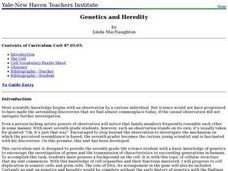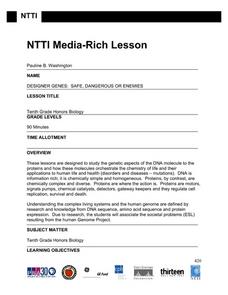Cornell University
The Making of Macromolecules
Compare and contrast macromolecules made from the same elements. Young scholars learn how the structure of a molecule has as much influence on a compound as the elements in the molecule. They experiment with molecular model kits to...
Curated OER
How Cells Duplicate and Why Where Something Can Go Wrong
Seventh graders explore the function of a cell and cell division. In this investigative lesson students construct a 3-D model of a DNA molecule.
Curated OER
Plankton / Phytoplankton
Students discuss the importance of plankton in the ocean ecosystem. For this biology lesson, students identify the different types plankton by observing them under the microscope. They explain how plankton population affect global climate.
Curated OER
Atoms and Elements: An Introduction
Students are able to discuss the difference between a proton, a neutron and an electron. They also can explain the difference between an ionic and a covalent bond. Students know the main structure of atoms and molecules. Student are able...
Curated OER
Ladders of Life
Students explore the field of genetics. They examine four basic traits. Students demonstrate their knowledge of phenotype and genotype by charting their personal traits. Students compelte a Meiosis chart. From the chart results,...
Curated OER
The Code of Life
Students study genes, DNA and medical research. They watch "The Code of Life" video and answer discussion questions regarding the transcription and translation of DNA and how errors in these processes and mutations in DNA can produce...
Curated OER
Winter
Students explore the nature of water and water molecules. They examine the role of ice on organisms.
Curated OER
Reading Chemical Formulas
Students interpret basic chemical formulas. When class begins, students interpret a "chemical formula" for fruit salad. After they interpret the recipe, students use the same strategies to identify chemical formulas. They evaluate the...
Curated OER
What Plants Need in Order to Survive and Grow: Light
Students conduct an experiment to evaluate whether plants need light to survive and grow. They observe and gather data about plant responses to different growth regimes, analyze the data, and make conclusions about basic plant needs.
Curated OER
Biology: Genetics and Heredity
Seventh graders explore the connection between genetics and heredity by examining the cellular structure. Among the numerous activities to engage students are drawing DNA molecules, vocabulary puzzle sheets, and predicting possible...
Serendip
Soap Opera Genetics – Genetics to Resolve Family Arguments
Did she cheat on her husband? Did the hospital switch the babies? Should they have children? As much as this sounds like the plot for a soap opera, all of these questions fit into a single lesson on genetics. Scholars read about three...
Curated OER
Diversity of Life
Students study the classification of viruses and describe their structure. For this investigative lesson students complete an activity and answer questions about viruses.
Curated OER
The Water Cycle
Students list the nine places on earth where water is found. They define the terms cycle and water cycle. Students explain how energy from the sun powers the movement of water molecules through the water cycle. They name and describe...
Curated OER
To Smell or Not to Smell, That is the Ester
Young scholars explain the basic concepts of polymerization. Students participate in a lab to create a crude preparation of carboxyl esterase and test its effectiveness in reducing the residual monomer in an emulsion such as paint.
Curated OER
Carbon: Structure Matters
Young scholars read the Who We Are Section on Calfee Designs Webpage and discuss carbon usage. They work in pairs to look up the minerals diamond and graphite then create a chart on the properties of each mineral then compare how they...
Curated OER
DNA and RNA
Tenth graders research the history and discovery of DNA. Using their text, they label a basic DNA structure and the composition of genes. They explain how RNA and DNA differ from one other and discuss the processes of transcription and...
Curated OER
Polymerase Chain Reaction and DNA Profiling
Learners examine DNA fingerprinting and polymerase chain reaction and how they are used in everyday life and for criminal investigations. They discover how these techniques can also be used to answer ecological and evolutionary questions.
Curated OER
It's the Slime Time
High schoolers experiment to understand the basic concept of polymerization and to understand the dissolution theory. Student experiment with polymers to understand its behavior and the mechanical behavior of polymer networks.
Curated OER
Habitable Zones
High schoolers focus on stellar luminosities to estimate size of habitable zones, map out habitable zone around hot light bulbs that serve as models of stars, investigate how size of model "habitable zone" around light bulbs depends on...
Curated OER
The Bean Growth Experiment
Fifth graders use modern technologies which allow them to gain a new, dynamic, and intersting understanding of themselves, their community, and the world. They focus on environmental education and the effect of the environment on plant...
Curated OER
Semipermeable Membranes and Bioaccumulation
Beginning biologists place a drop of food coloring into water of differing temperatures to observe the effect on the diffusion rate. They remove the shells from raw eggs and then experiment with osmosis over the remaining membranes....
University of Georgia
Flavor of Organic Chemistry
Introduce organic chemistry through an analysis of flavor. A three-part unit begins with an overview of the components of flavor. Next, scholars prepare esters through esterification. Finally, they examine how all senses have an impact...
Curated OER
Carbon Cycle Capers
Students examine the carbon dioxide cycle in the atmosphere. In this element lesson, students discuss the relationship between carbon dioxide on Earth and the plants that store it. Students play a game to ensure their understanding.
Curated OER
Temperature and the Tomato
You will need a photovoltaic system and monitor at your school in order to obtain all of the data required to thoroughly implement this lesson. Your class monitors daily temperature and insolation amounts over a two week span of time....























